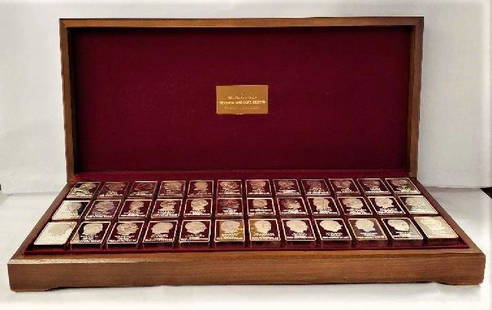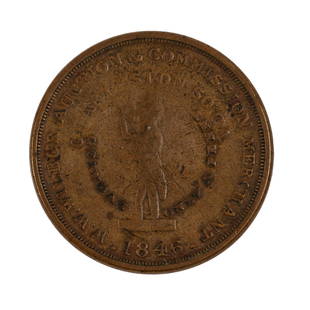
James McHenry “fewer men have been killed in battles since the discovery of gun-powder”
Similar Sale History
View More Items in Historical Memorabilia![James McHenry Writes Benjamin Tallmadge about Origin and Conduct of War of 1812: James McHenry Writes Benjamin Tallmadge about Origin and Conduct of War of 1812 JAMES McHENRY, Autograph Letter Draft, to Benjamin Tallmadge, January 23, 1813, Cherry Tree Meadows, [Maryland]. 2 pp.,](https://p1.liveauctioneers.com/6306/260874/135867891_1_x.jpg?height=310&quality=70&version=1662577413)
Related Historical Memorabilia
More Items in Historical Memorabilia
View MoreRecommended Collectibles
View More



Item Details
Description
James McHenry “fewer men have been killed in battles since the discovery of gun-powder” Writes to Fellow Signer of the Constitution
JAMES McHENRY, Autograph Letter, Draft, to Hugh Williamson, May 15, 1799, [Maryland]. 2 pp., 7.875" x 12.875". Expected folds; minor edge tear and hole, not affecting text; very good.
In response to a query from former Congressman Hugh Williamson, Secretary of War James McHenry waxes philosophical about the invention and use of gunpowder.
"Is it a substantiated fact that wars have been come less frequent & that fewer men have been killed in battles since the discovery of gun-powder, and that the discovery of this powder has been the cause of their being less frequent and less destructive?"
Complete Transcript
[M????d] 15 May 1799
Dear Sir
I received your letter of the 9th of Febry ulto relative to the best proportions for making gun-powder.
"Assist me, as Pliny says in his letter to Tranquillus, in settling my doubts." A Philosopher, by accident if you please, discovers a powder, which if inflamed and properly managed, will blow up a ship, or destroy an army; and having fully ascertained the qualities of his powder publishes his discovery to the world. Another philosopher, in a different age, and let us suppose a moral and religious man, after long researches and numerous chemical experiments finds out a mode of doubling the destructive effects of this powder, and causes his experiments and discovery to be published in all the magazines and news-papers. A warrior who knows nothing about philosophy and who would never have troubled his head about such experiments, but withal a moral and religious man (for there have been such military characters) employs this powder successfully in destroying armies and blowing up ships loaded with men. Which of these two distinguished personages, the philosopher or warrior are we to rank among the benefactors of mankind? Has my good Doctor, Philosophy descended from heaven, only to open new and more numerous avenues to death?
Is it a substantiated fact that wars have been come less frequent & that fewer men have been killed in battles since the discovery of gun-powder, and that the discovery of this powder has been the cause of their being less frequent and less destructive?
It is out of my power at this time, to do any thing for the young gentlemen you have recommended for military appointments.
I am Dr sir yours truly & sincerely
Hugh Williamson Esqr
James McHenry (1753-1816) was born in Ireland and sent by his family to North America in 1771 to regain his health. He settled in Philadelphia, where he completed an apprenticeship under Benjamin Rush and became a physician. During the Revolutionary War, he served as a surgeon. He became a secretary to General George Washington from May 1779 and to the Marquis de Lafayette from August 1780. He retired from the army in the autumn of 1781. He was immediately elected to the Maryland Senate in 1781 and as a delegate to Congress in December 1784. In 1787, he was a delegate from Maryland to the Constitutional Convention, and he signed the U.S. Constitution. He served in the Maryland House of Delegates from 1788 to 1790 and in the Maryland Senate from 1791 to 1796. In the latter year, President George Washington appointed him as Secretary of War, a position he held through most of the administration of John Adams. Opposed to many of Adams's policies, McHenry resigned in May 1800 at the president's request. He spent the remainder of his life at his estate "Fayetteville" near Baltimore, Maryland, that he had purchased in 1792. He maintained an extensive correspondence with fellow Federalists Timothy Pickering and Benjamin Tallmadge. The famed fort in Baltimore harbor that played a central role in the War of 1812 is named for McHenry.
Hugh Williamson (1735-1819) was born in Pennsylvania and graduated from the College of Philadelphia (University of Pennsylvania) in 1757. He studied theology in Connecticut but was not ordained and returned to the College of Philadelphia as a professor of mathematics from 1761 to 1764. He traveled to Europe, where he began a friendship with Benjamin Franklin and became his scientific collaborator. Williamson received a medical degree from the University of Utrecht. He returned to Philadelphia, where he practiced medicine before settling in North Carolina. During the Revolutionary War, he served as a surgeon for North Carolina troops (1779-1782) and represented that state in the Continental Congress (1782-1785, 1788), at the Constitutional Convention (1787), where he signed the U.S. Constitution, and in the first two Congresses (1790-1793). In 1793, he retired to New York City, where he wrote scientific treatises and a two-volume History of North Carolina (1812).
Provenance: Parke-Bernet Galleries, New York, ca. 1930s.
This item comes with a Certificate from John Reznikoff, a premier authenticator for both major 3rd party authentication services, PSA and JSA (James Spence Authentications), as well as numerous auction houses.
WE PROVIDE IN-HOUSE SHIPPING WORLDWIDE.
Buyer's Premium
- 25%
James McHenry “fewer men have been killed in battles since the discovery of gun-powder”
Shipping & Pickup Options
Item located in Wilton, CT, usPayment

Auction Curated By


























![Bull Run & Defense of Yorktown! [NC Confederate]: [Bull Run] has cost the South many gallant men and many homes are made desolate, [but] who will not give heartfelt thanks to the God of Battles for this victory[?]” - Alex Ray, 1st North Carolin](https://p1.liveauctioneers.com/7226/234046/121131713_1_x.jpg?height=310&quality=70&version=1642304372)





![[Native Americana] M'Kenney, Thomas L., and James Hall History of the Indian Tribes of North: [Native Americana] M'Kenney, Thomas L., and James Hall History of the Indian Tribes of North America, with Biographical Sketches and Anecdotes of the Principal Chiefs... First Edition of McKenny and H](https://p1.liveauctioneers.com/65/289207/153001071_1_x.jpg?height=310&quality=70&version=1683915408)



![1785 Connecticut Men Protest Restrictions on Raising Pigs: 18th century ConnecticutNorwich, CT, ca. 17851785 Connecticut Men Protest Restrictions on Raising PigsMDS[CONNECTICUT.] James Lincoln et al., Manuscript Document Signed, Petition to the Mayor, Alderme](https://p1.liveauctioneers.com/6306/327579/176471782_1_x.jpg?height=310&quality=70&version=1714074043)


















![10 Days After His Assassination JFK Signed W. H. letter, Fantastic! Among JFK's Last Acts in White H: John F. Kennedy[Washington, D.C.], December 2, 196310 Days After His Assassination JFK Signed W. H. letter, Fantastic! Among JFK's Last Acts in White House Post Dated Before Dallas TripTLSJOHN F. KENN](https://p1.liveauctioneers.com/6306/327579/176471594_1_x.jpg?height=310&quality=70&version=1714074043)




![Reagan Presidential "Camp David" Pickard China Dinner Plate: Presidential[Camp David], n.d.Reagan Presidential "Camp David" Pickard China Dinner PlateTablewareA Pickard China (Antioch, Illinois) dinner plate, almost certainly dating from the Reagan ad](https://p1.liveauctioneers.com/6306/327579/176471666_1_x.jpg?height=310&quality=70&version=1714074043)


![S. Sewall Court Document Involving Three Participants in Salem Witch Trials: Salem Witch TrialsSalem, MA, 17th centuryS. Sewall Court Document Involving Three Participants in Salem Witch TrialsADS[WITCHCRAFT.] Stephen Sewall, Autograph Document Signed, Writ of Attachment in Ma](https://p1.liveauctioneers.com/6306/327579/176471806_1_x.jpg?height=310&quality=70&version=1714074043)












![[Ambrotype] Texas Confederate Soldier: Sixth plate ambrotype. Full leatherette case. Portrait of a possible Texas Confederate soldier. A silver star device was used to pin up the brim of his light-toned headgear, a look often seen in image](https://p1.liveauctioneers.com/7226/322253/173251509_1_x.jpg?height=310&quality=70&version=1710004847)


![Captured Bowie Knife w/ Period Note of Provenance: Captured Confederate D-hilt Bowie knife. [Kenansville, North Carolina]: [Louis Froelich factory]. With original metal and leather sheath with affixed period notes. First note with only remnants. Secon](https://p1.liveauctioneers.com/7226/325455/175169154_1_x.jpg?height=310&quality=70&version=1712370394)

![[Civil War] Bullet Which Nearly Killed Soldier: Lead bullet encased in gold acorn fob with chain. Finely engraved: "W.D. Fiske / 14th Regt. C V / Fredericksburg / Dec 17, 1863." Acorn approx. 1 1/2 x 1 in. Overall length 6 1/2 in. Published in "Her](https://p1.liveauctioneers.com/7226/325455/175169103_1_x.jpg?height=310&quality=70&version=1712370394)